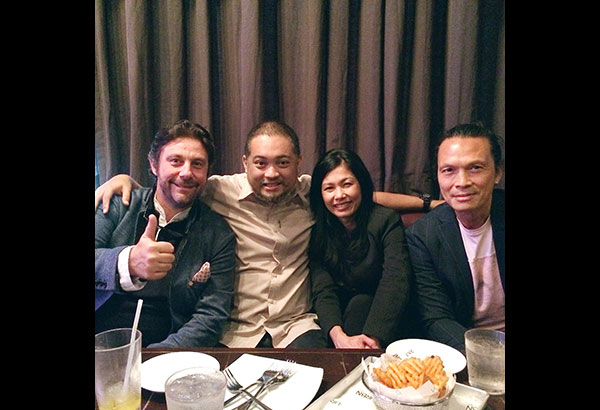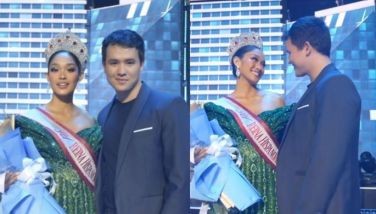Pinoys set to shine via inaugural MasterChef Asia
MANILA, Philippines - Food sustains as much as it entertains.
How else could one explain the immense success of the MasterChef franchise? First airing in 1990, the Franc Roddam-conceived TV reality series showcasing culinary acumen has spun off into a number of equally successful variants. Tomorrow, the hit show will resonate even closer to home via the debut of the first-ever MasterChef Asia.
Airing on Lifetime at 9 p.m., Pinoy viewers have more reasons to tune in as three Filipinos vie for the honor of making it to the end of the show — and securing the much coveted title. After a rigorous process, Rico Amancio, Jake Aycardo, Lica Ibarra earned the nod of producers and were sent to Singapore for the five-week (in real time) competition, along with the taping, of course. A total of 15 contestants from eight countries participated in what is arguably the world’s most popular cooking tilt. At stake is quite an eyeful (and mouthful): The winner gets his or her very own cookbook, $50,000 in cash, $10,000 worth of “leisure experiences in Singapore,” $15,000 worth of Panasonic home appliances, a paid internship at one of Carlton Hotel Singapore’s restaurants, and a one-week stay at the Hong Kong Disneyland Resort.
In town recently to promote the series were the MasterChef Asia judges and mentors themselves — experienced chefs tasked with separating the grain from the chaff.
The Hong Kong-born (now based in Canada) Susur Lee is known as the “Father of Fusion” and has won numerous culinary awards and distinctions, including making it to the list of Food & Wine’s “10 Chefs of the Millennium” and a Five-Star Diamond Award from the American Academy of Hospitality Sciences.
Bruno Ménard belongs to “a family with culinary heritage” (his father was a chocolatier, his grandfather a patissier). He has spent some two decades in Asia — helping establish some of the region’s best restaurants. Ménard’s own L’Osier restaurant in Tokyo has received a top rating of three stars from the prestigious Michelin Guide. He resides in Singapore with his wife, and concurrently runs a top-tier culinary consulting there.
Lastly, Audra Morrice admitted to “having been on the (contestants’) side of the bench” as a participant of MasterChef Australia in 2012, where she placed third. Morrice is hailed as the “Next Martha Stewart of Asia,” and is already a culinary TV star aside from being proprietor of her own catering business. Born to a Chinese mother and Indian father, Audra spent her formative years in Singapore before residing in Australia.
Morrice said that the experience of cooking at home is very different from whipping dishes up on MasterChef Asia. Speaking as a former participant, she averred that “the love and passion… will carry you through — and the fact that you’re there to win it.”
In The STAR’s subsequent exclusive interview with the judges, Morrice shared that the Filipino contestants “all have stories on why they did things a certain way.” She continued: “It was all very rich in Filipino heritage. When other people are asked why they bring up a certain dish, they just say they cooked it because they saw a recipe somewhere.”
For his part, Ménard asserted that viewers can expect to “learn a little bit more about what the Philippines is all about in terms of food.” He added that, invariably, all of the three Pinoy contestants would tell the judges: “In the Philippines, we do it like this.”
“What stands out for me about the Filipino contestants is that they’re very emotional — the way they fuss around with their hands shows how the emotions transfer to their fingers when they’re cooking. But (there’s also) humor. They can laugh in the moment; it’s very spontaneous,” observed Susur with a smile.
The popular chef also asserted that even during the competition, the “Filipinos also seem to want to socialize with (us). The warmth came through.” That is something that stood out from other nationalities, he added, and that it showed up on camera.
With stories are as diverse as their backgrounds, Lica, Jake, and Rico nonetheless realized a common dream of making it to the proving ground of MasterChef Asia. From thousands of audition video clips (the most in the region, according to Ibarra) from Filipino cooks and amateur culinary aficionados, the three made it through a cook-off in Manila then another final cut in Singapore.
Exclusively interviewing the three Pinoy participants, this writer learned that while each was doing totally unrelated work, the passion for cooking was self-evident. Jake Aycardo shared: “I was preparing packed lunches for my officemates. I would cook for 30 to 50 people a day.” Even as he worked for a bank, he nurtured dreams of working for an exclusive restaurant. He has said farewell to his old job, and is pursuing a future in the field.
The well-traveled Rico Amancio enjoys the experience of cultural exchange via the culinary currency. “I usually live with the locals,” he said, and narrated he would cook for his hosts while they taught him a thing or two about local cuisine. Amancio used to be a paralegal for a multi-national insurance company until he realized “this is really what I want to do.”
Equally adept with numbers as she is in sports (she previously represented the country in the Women’s National Football Team, and plays Ultimate Frisbee) banker Lica Ibarra is out to prove she’s no flash in the (kitchen) pan. She confessed to dreams of having her own restaurant or cooking/travel show. But for now, she savors the financial freedom and stability of her present job trading treasury products — particularly since she’s a single mom looking after a seven-year-old son.
Even as MasterChef Asia has wound up taping, everyone connected to the show is tight-lipped about the result, but promise a compelling first season.
“The pressure is real. The pressure is times 10 what we see on TV,” confessed Ibarra. “The stress comes from everything — the time pressure, the ingredients, the challenges, and, of course, other competitors. We’re up against top cooks around Asia.”
“The format is completely unique,” volunteered Bruno Ménard, “and for the first time ever, eight countries are battling each other.”
Susur Lee maintained: “When you look at Asia, you see a diversity of beliefs and lifestyles. National pride is so important. The show is also a great way of showing diversity.”
And vaunted Filipino culinary skill, of course.
 The author (second from left) poses with MasterChef Asia chef-judges (from left) Bruno Ménard, Audra Morrice and Susur Lee at the recent Manila stop of the show’s promo tour
The author (second from left) poses with MasterChef Asia chef-judges (from left) Bruno Ménard, Audra Morrice and Susur Lee at the recent Manila stop of the show’s promo tour
- Latest
- Trending



















 Exclusive
Exclusive














